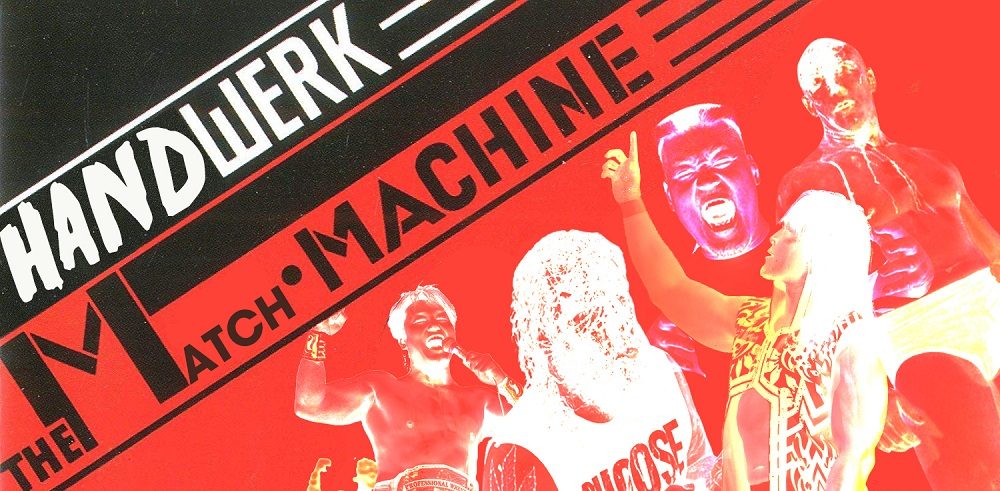A month after Takada having to give his win back to Maeda, this is a much more disappointing step backwards, as still clearly struggling through the effects of a small roster, the UWF runs back its best match to date, and has Yamazaki give his own career win back to the golden boy.
Boring booking aside, again with these two, it’s really good.
Part of that is because I think that, while maybe Maeda with either man can bring a feeling of occasion to a match that elevates things, Yamazaki and Takada have the most natural chemistry of anyone in the first year of the second UWF.
That’s even with all the problems. This match is not immune from the usual Takada issues or earlier stylistic issues, like hold repetition in a match over fifteen minutes without much to differentiate those moments, or weird pacing that you maybe get as a way to suggest more authentic fight rhythms but that often just breaks up the flow when not handled super well, or things like that. It is nowhere near as clean or well put together or satisfying as their previous match, and it isn’t incorrect to label this match also as something of a disappointment (weird trend with Takada!).
It’s just that all of that matters a little less with these two.
Something about them together just works, and that’s before the large leap that Yamazaki’s begun to take, to the point that he now feels like definitely the best wrestler in the company. This feels like the most advanced match yet, in terms of what the style will become, even only at points. Yamazaki expands a more kick heavy opening section he showed against Miyato a few months prior, but this is also more heavy on the throws than usual, for Takada especially. It feel like the most functional gathering of a bunch of different elements of the style in a way that isn’t often there throughout the first year of this company, which at least for a majority of the match, makes for something a little more dynamic than usual, especially from one half of this.
Part of that is also that — again in a UWF Takada match — while I’m not in love with the overall end product, I really do like the approach.
The result is a boring one that strips a badly needed number three guy of his major edge, but the way it’s done is something I find pretty interesting. For most of the match, Takada wrestles with a respect, occasionally bordering on fear, that he did not have six months earlier. It’s more than a little bit of fanwank, absolutely, but at times he seems even more tentative than he did against Maeda, as if he gets how the king of this shit maybe got him before, but seems either unsure of how Yamazaki got him in August ’88 and won’t take the chance or totally aware and working with a fear of Yamazaki’s kick that he doesn’t have for any other singular strike or kick in the UWF.
What comes out of that is maybe not the perfect match, but something that through that narrative, covers up a lot of stylistic or Takada-specific flaws. When the pauses do come, they feel a little less stilted than usual when read as a shook Takada trying to adjust. Likewise, in the moments in the last third of the match when Yamazaki finds his opening and explodes, it makes a lot of those moments, not just the stalls but also some quieter ones in general, worth it for that payoff. Not only in the sense that they can be read as Yamazaki waiting him out, but in a character sense, a show of real growth for Yamazaki in not forcing it.
Yamazaki still gets it, of course. Nothing is perfect, and one of the least interesting guys possible has to benefit in the end. However, again, it’s how they do it that I think helps a lot. Takada survives the flurry this time and tries his own, only to do way less damage than he thought, only to just barely grab onto the singular deepest heel hook of his career to this point for the win.
Stupid little golden boy gets his win back, but in a way that does more for Yamazaki than one might think. Again, it’s Nobuhiko Takada going into a match seemingly intent — although less so than January — on winning in one way, only to simply not be able to. There’s some growth for him too, if you’re dull enough to care about him, in how he abandons what isn’t working to desperately grab something, but as both a hater and one of the bigger Yamazaki fans there is, I prefer the interpretation instead that he again couldn’t land the emphatic victory he wanted, and again managed to fall short at the same time that, on paper, he theoretically succeeded.
Every Yamazaki/Takada match feels worth watching, and for a few different reasons, this is no exception.
